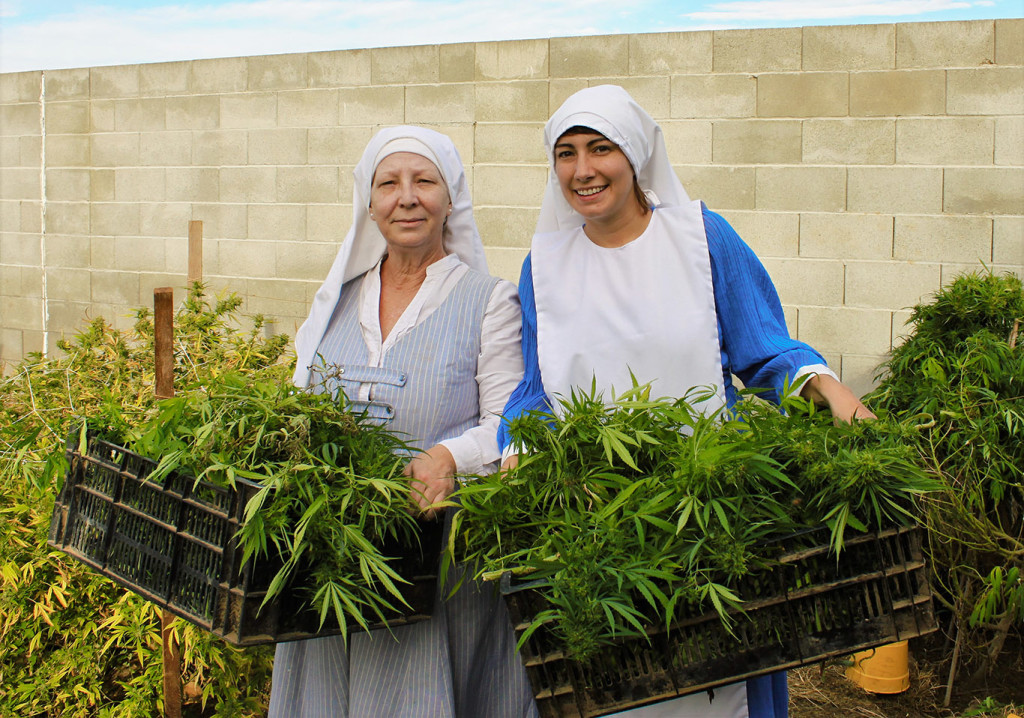Religion
Related: About this forumHow Ancient Religion Got You High
Religion and drugs wouldn’t seem to mix well, but history tells us otherwise.

05.08.16 12:00 AM ET
Candida Moss
Earlier this year a small group of self-designated nuns in California known as the Sisters of the Valley were embroiled in a legal battle over their right to grow, bless, and distribute marijuana. It’s a peculiar case, the roots of which lie in an error in the newly introduced California Medical Marijuana Safety and Regulation Act. The discrepancy was cleared up but the case drew attention to the Sisters of the Valley and their unusual vocation: to turn stoner culture into healing culture.
Many people, including the founder of the order, would question whether or not the Sisters of the Valley are actual nuns (the founder, Sister Kate, decided to assume the status of nun when in 2011 Congress decided that two tablespoons of tomato paste qualified as a vegetable. She felt that if pizza was a vegetable she could be a nun). But irrespective of their official status, the Sisters of the Valley aren’t the first group to blend religion and narcotics.
There are veiled references to drugs in the religious literature of a number of ancient societies. In Homer’s Odyssey the protagonist Helen, the daughter of Zeus, casts the antidepressant drug nepenthe into wine in order to quiet the drinker’s “pain and strife.” According to Homer, the drug originally came from Egypt, and Helen obtained it from the wife of an Egyptian nobleman.
Although the prohibitions are not Biblical, most branches of Judaism and Christianity disapprove of drugs other than alcohol. But, in 1967, a Polish anthropologist claimed that the plant kaneh bosm, mentioned five times in the Hebrew Bible and used as an ingredient in anointing oil in Exodus, was actually cannabis. This theory has been dismissed as “ridiculous” by subsequent generations of scholars.
http://www.thedailybeast.com/articles/2016/05/08/how-ancient-religion-got-you-high.html
https://sistersofcbd.com/?v=7516fd43adaa
MADem
(135,425 posts)Igel
(35,309 posts)Enjoy wearing your running cabbages when you go to the gym.
The distribution is odd. Note that in the 1930s Polish linguists were busy trying to separate themselves entirely from anything Russian. A new Urheimat of the Slavs was proposed, no longer on what was later Soviet or Russian territory, and the idea of Russians < Scythians meant Scythian was a no-no. Russophobia wound up leading to some strange conclusions, and Benetowa was probably no stranger to it.
They'd rather assume that somehow it came from Semitic, even though the distribution is skewed, the linguistics is a bit off, and while there's an easy means of transmission from Central Asia (where the plant was native) west and south, and a means from N of the Middle East southwards, there's not a decent means of transmission northward. Doesn't mean it's impossible, just not as likely. It took a bit of daredevilry to say that somehow it came in with Jews or Semites, or spread from them (unless Benetowa was into the "Semites are the root of all evil," but mostly she just seemed to want to advocate for marijuana and find justifications for what she wanted).
As soon as you see people find that God really does support what they always wanted and read it into 2500-old texts, so instead of something being bad it's instead sacred, be suspicious. Things aren't usually that convenient, and, as Feynman accurately pointed out, the easiest person to deceive is yourself.
MADem
(135,425 posts)Nor would he be drinking alcohol in mufti.
See? Words DO travel. And they can travel up-down-sideways and half-way round the world, and more.
We're not talking about chous, petite or otherwise, we're talking about weed.
Prove that's NOT what that word means, and we can talk. We already know that chou is not shoe, because (aside from helpful French-English dictionaries) if you order chou in the French restaurant, you're going to get a plate of cabbage. If you order "shoe" you'll get the same.
I'm also not talking about "God" supporting (or not supporting) anything. I'm just talking about a word that sounds like cannabis. It happens to appear in a Biblical text.
Show me a translation that says that word (that sounds like cannabis) means something else and I will happily revise my view.
rug
(82,333 posts)
MADem
(135,425 posts)that cannabis oil was a function of ancient medicine. I believe them--it makes sense.
rug
(82,333 posts)MADem
(135,425 posts)Of course, in the Rastafarian faith (which is quite complex in some regards), ganga is a sacrament as well!